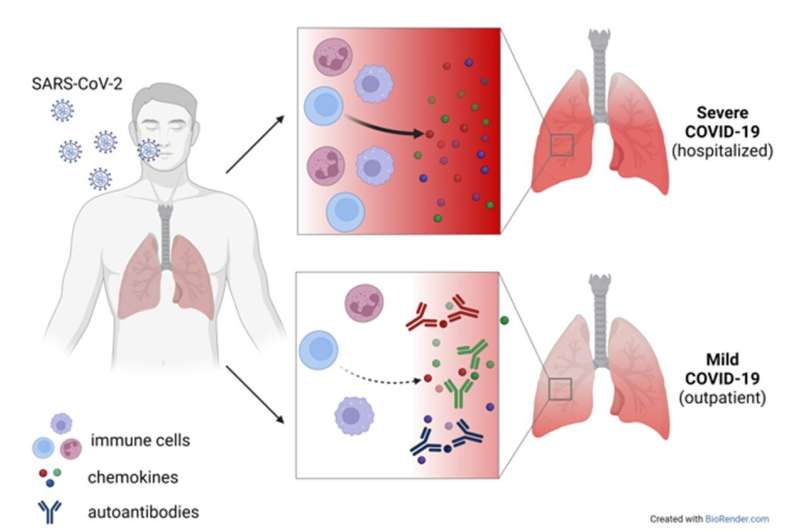This article has been reviewed according to Science X's editorial process and policies. Editors have highlighted the following attributes while ensuring the content's credibility:
fact-checked
peer-reviewed publication
proofread
'Good autoantibodies' could help against long COVID

Sometimes in the laboratory there are unexpected results. "Previously it had been observed that autoantibodies are common in severe COVID patients, those who end up in intensive care," says Jonathan Muri, postdoctoral fellow at the Institute for Research in Biomedicine (IRB, affiliated with the Università della Svizzera italiana) and co-author of the study. "Instead, in this case we discovered the opposite."
The autoantibodies in question neutralize chemokines, molecules that direct immune cell trafficking. "Chemokines are a bit like traffic lights: they tell our immune cells when and where to go in the case of an infection so that they can fight it," adds Valentina Cecchinato, also at the IRB and co-author of the study. "In the presence of the autoantibodies, the traffic lights are blocked and the influx of the cells that make inflammation chronic decreases." In short, it helps to turn off the inflammatory response.
Initially incredulous, the researchers also analyzed blood from patients recovering after COVID-19 from two other hospitals, with the same result. But how does blocking the immune response help in COVID? "The immune system in some cases is a double-edged sword," says Mariagrazia Uguccioni, co-director of the study, "it is important to activate it promptly to neutralize the coronavirus, but it must also be turned off at the right time, otherwise it can do damage."
In fact, what usually brings patients to the hospital is excessive inflammation induced by the infection. So autoantibodies against chemokines could have a beneficial anti-inflammatory effect. "There is still a lot of work to be done," adds Davide Robbiani, co-director of the study and director of the IRB, "for now we can say that the presence of these 'good autoantibodies' is associated with a milder course and a lower risk that symptoms will continue for a long time," as observed in many patients who unfortunately still suffer for weeks or even months after COVID-19.
The research is published in the journal Nature Immunology.
More information: Andrea Cavalli, Autoantibodies against chemokines post-SARS-CoV-2 infection correlate with disease course, Nature Immunology (2023). DOI: 10.1038/s41590-023-01445-w. www.nature.com/articles/s41590-023-01445-w


















